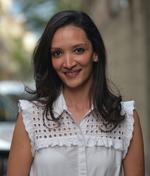Lianna Flavia D'amato
Dottorando/a

Contatti
Presso
- Cultural heritage and historical-artistic, audiovisual and multimedia production
- Dottorato in Patrimonio Culturale e produzione storico-artistica, audiovisiva e multimediale
Temi di ricerca
Lianna Flavia D'Amato graduated in Italian and linguistic sciences at the University of Bologna, where she developed an interest in Linked Open Data, the subject of her thesis («Portraits of teachers» in Linked Open Data: a model for describing relationships).
Her interest focuses on preserving, enhancing, sharing and research for cultural data through LOD methodologies, which she had the opportunity to deepen by attending the Summer School in “Linked Open Data for cultural heritage” at the Alma Mater Studiorum - University of Bologna (Ravenna) and also during her work as a Digital Humanist at the company Synapta Srl.
Since 2017, she has been a member of Wikimedia Italia, a volunteer and active contributor on the Wikidata, Wikisource and Wikimedia Commons platforms to enhance data from cultural heritage projects.
In 2018, she won a research scholarship for the Open Literature project at the Department of Modern Languages, Literatures and Cultures, which led to the development of a model for the description of theatrical performances on Wikidata (contribution presented during the conference “Challenges and alliances between Libraries and Wikipedia” at the National Central Library of Florence).
In 2019, she won a research scholarship for the Sound Archives & Musical Instruments Collections project at the Department of Humanities of the University of Turin, contributing to the enrichment of the controlled vocabularies on Wikidata (relating to musical instruments and musical genres) to be connected to the cataloging system of musical instruments of the Museo del Paesaggio Sonoro (Riva presso Chieri).
Since 2022, the collaboration with Regesta.exe Srl has provided her with the opportunity to work in the context of cultural heritage projects which involves the publication of libraries and archives’ catalogues using Linked Open Data (CoBiS LOD); this experience allowed her to improve her knowledge and develop skills about analysis, mapping, transformation and querying of structured data.
In 2023, she was a research fellow at the Department of Humanities of the University of Turin for the project: “Linked Open Data and ontologies in the ethnomusicological domain”.
Her research activity focused on the conceptualization of an ontological model for the representation of knowledge in the ethnomusicological domain.
She is currently a PhD Student at University of Turin in “Cultural heritage and historical-artistic, audiovisual and multimedia production” and her research project focuses on the analysis of taxonomies, ontological representation models for organological and musical iconographic research.
Taxonomies, Ontological Representation Models, and Discovery Tools for Organological and Musical Iconographic Research
This project falls within the scope of cultural preservation and cultural heritage initiatives that leverage LOD (Linked Open Data) technologies to enhance and share data. The aim of the project is to study and define shared ontological models for representing data related to musical instruments and musical-iconographic works, with a focus on semantic interoperability and the reuse of open data.
Starting from the results of the SAMIC project at the University of Turin, which dealt with the integration of the Hornbostel-Sachs classification into Wikidata through a mapping between the MIMO revision and that of Febo Guizzi, the goal is to update and optimize the digital representation of the Hornbostel-Sachs classification. Currently, this classification lacks, for instance, an implementation of the electrophones class—an essential component for the sharing of open data on musical works in electronic music, art music, and popular music. The updated taxonomy, complemented by data curation actions on the knowledge base, will enable more precise metadata creation and semantic description of musical-iconographic works using Hornbostel-Sachs systematic taxonomy.
The adoption of Wikidata as an open data hub presents an opportunity to publish and enrich data with external sources, promoting data reuse and interoperability. These data are not only accessible but can also be queried in customized ways using SPARQL, revealing new correlations through the relationships that connect even distant domains.
The aim is to provide the scientific community with descriptive (semantic) models in the organology, ethno-organology, and musical iconography domains. These models will be tested with a sample corpus of musical-iconographic works (described from an organological perspective) and cataloged instruments from the Museo del Paesaggio Sonoro in Riva presso Chieri.
The final goal is to deliver SPARQL queries to support discovery tools in the organological and Musical Iconographic domain.
Attività in agenda




